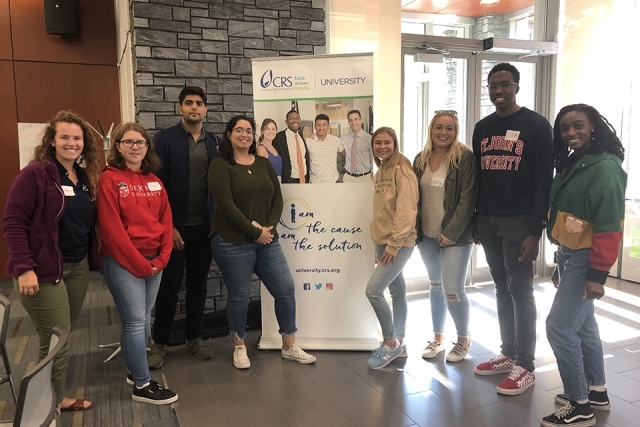
While the COVID-19 crisis captures the attention of the entire world, uniting countries in an unprecedented effort to find a cure, the needs of the most vulnerable among us have not gone away. If anything, they have become even more dire.
For decades, Catholic Relief Services (CRS) has been on the front lines of nearly every global crisis, and this situation is no different. In 2016, St. John’s University was established as a Global Campus of CRS, and, since then, they have been the University’s international aid partner, a relationship only intensified by the COVID-19 health crisis.
“Everyone connected to the work of CRS at St. John’s remains very active during this difficult time because we know that the poor and marginalized continue to suffer and more deeply feel the effects of the current pandemic,” said Victoria M. O’Keefe, Residence Campus Minister for Social Justice and Coordinator of the University’s relationship with CRS.
Ms. O’Keefe oversees the student ambassadors who run awareness campaigns on campus, organize collections for CRS programs like CRS Rice Bowl, advocate with legislators, and set up events such as lectures, prayer vigils, and prayer services. “I am proud of the work that CRS does around the globe and how St. John’s furthers and enhances that work,” she added.
CRS Rice Bowl is a Lenten program that has collected nearly $300 million since its inception in 1975; it traditionally collects funds using a simple cardboard box but now has transitioned online, with students soliciting donations via e-mail and phone.
St. John’s student ambassadors usually attend the annual CRS Student Ambassador Leaders Together (SALT) Summit, which is an opportunity for students and staff leaders to learn more about the work of CRS and acquire skills to take proactive measures to combat global poverty. This year’s summit has been postponed until 2021 due to the pandemic.
“However, our students connected with CRS leadership to see how they can continue their advocacy through online platforms,” Ms. O’Keefe noted, adding that while in-person legislative advocacy is always preferable, students now reach out to representatives with personalized letters and phone calls.
Faculty at St. John’s share a commitment to CRS as the CRS Global Campus Committee awarded five grants to faculty members who promote and advance research aimed at serving others. Grant proposals must be directly linked to promoting sustainable development, fighting disease among marginalized communities, nurturing a peaceful society, or responding to natural disasters or conflict emergencies.
Ms. O’Keefe added that CRS has been extremely helpful during the pandemic. They hold WebEx meetings with their global campuses and give advice on how to not only alter their advocacy, but how to help prevent the spread of COVID-19. They also offer assistance for any needs arising from the pandemic. Ms. O’Keefe has also been a part of breakout sessions designed to share best practices with other campus leaders.
“As a CRS student ambassador, I am proud to be one of many bringing global issues to the attention of St. John’s students,” explained Global Development and Sustainability major Grace Musser. “We focus on a range of social justice matters, specifically environmental sustainability, fair trade/ethical consumption, human trafficking, hunger, migration, and poverty.”
Grace, who will serve as Co-President of the student ambassadors during the upcoming academic year, noted that in the past year she has connected with local and state representatives to advocate for CRS-supported initiatives and programs. “CRS empowers me to feel comfortable expressing my interests as a constituent and as a social justice advocate.”
“There were so many injustices before the pandemic,” Ms. O’Keefe stressed. “The pandemic has certainly exacerbated that and made it worse for the most vulnerable among us. Our work draws attention to those communities that are not as resilient. Now is a good time for us to restructure and reprioritize what is most important to us: basic rights and dignities that are inherent to all persons.”
Related News
St. Thomas More Church at St. John’s Featured on “NYC Catholic Church Tours”
Adam Llorens is an emerging Catholic social‑media content creator and storyteller whose passion for sacred spaces, faith, and community informs and inspires a growing online audience. Mr. Llorens, a...
Vincent’s Table Brings Dignity and Support to Students Facing Food Insecurity
Food insecurity among US college students is a rising problem. About 3.8 million college students experienced food insecurity in 2020 and it has only grown steadily worse.
Leading with Heart: Lucy A. Pesce Recognized for Changing Lives at St. John’s
Commitment to the Vincentian mission shone brightly last week when Lucy A. Pesce, Executive Director for Mission Initiatives at St. John’s University, was honored by Depaul USA with the Dax Champion Award for her unwavering leadership and compassion. Ms. Pesce’s recognition highlights not only her personal dedication but also the University’s broader mission to uplift and serve individuals experiencing homelessness.
